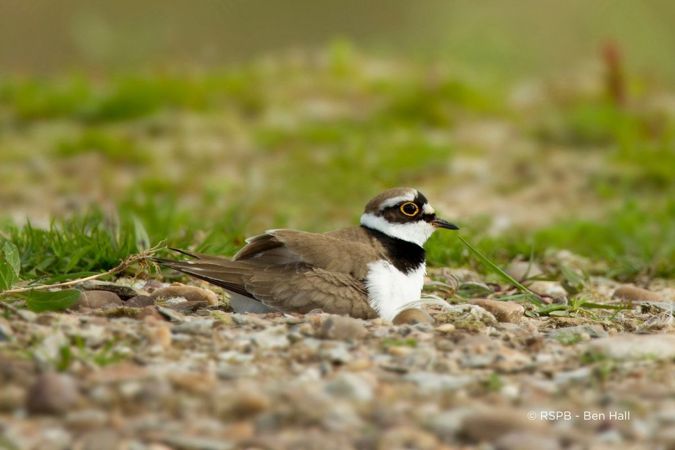Dog owners urged to keep pets on leads to protect birds as breeding season begins

Natural Resources Wales (NRW) and RSPB Cymru are urging dog owners to play their part in protecting ground-nesting birds this spring by keeping pets on leads during breeding season.
The environment body for Wales has joined with the bird conservation charity to call on dog owners to help safeguard species such as Curlews, Skylarks, Nightjars and Oystercatchers during this critical nesting period, which runs from March to August.
Such birds are susceptible to disturbance from unsupervised dogs at this time of year, which can cause them to abandon their nests through fear, leaving eggs and chicks unprotected and at risk of perishing if left alone for too long.
While most people will think of birds’ nests as being high up in trees, a surprising number make their fragile nests on the ground, or just above it, tucked away on beaches, in long grass, at the base of trees, or in low bushes. Camouflaged by their surroundings, the nests can be very difficult to see and are easily at risk of accidental trampling, disruption or harm from dogs.
The number of nesting birds in the British countryside continues to decline, with a study by RSPB, Birdlife International, and Czech Society for Ornithology revealing a drop of 600 million breeding birds in the UK and EU since 1980. Such disruptions can have long-lasting effects on bird populations, drastically impacting breeding success and survival rates.
Both NRW and RSPB Cymru warn that even the most well-behaved dogs can unintentionally cause distress or damage to wildlife. They are asking owners to keep dogs under close control or on a lead, and on marked walking paths during the spring and summer months to help protect vulnerable bird species. Owners are advised to also check local signage, as there are some areas where dogs must be kept on a lead for all or part of the year.
Alison Roberts, Specialist Advisor for Responsible Recreation at Natural Resources Wales said:
“As spring arrives, many will explore Wales’ countryside with their dogs, but it’s important to follow the Countryside Code and be mindful of wildlife. Rare and threatened birds will begin breeding across the country in open areas like grasslands, heathlands, moorlands, coastal regions, wetlands and farmland including several migratory species who will have travelled thousands of miles to breed in the UK.
“Ground-nesting birds are very vulnerable during this time, with some now endangered due to habitat loss, predators and human disruption, including dog walking. We are calling on dog owners to do their bit to help safeguard these legally protected birds by keeping their dogs under close control – ideally leashed –during the bird nesting season.
“Always keep your dog in sight and only let them off the lead if the law allows and if you can be confident your dog will return on command. Taking these steps will ensure birds can raise their young undisturbed so future generations can enjoy Wales’ natural beauty.”
All wild birds, their nests, and eggs are legally protected in Wales under the Wildlife and Countryside Act 1981, which makes it an offense to intentionally kill, injure, or take any wild bird, as well as take or destroy any of their nests while they are in use or being built.
Dog owners may not know that, in order to protect ground-nesting birds, it’s also a legal requirement to keep dogs on leads no longer than two metres while on open access land between 1st March and 31st July. People risk fines of up to £1,000 if they fail to do so.
Julian Hughes, Head of Species at RSPB Cymru said:
“Most dog owners are responsible and passionate about nature and want to avoid harming it. But even well-behaved dogs can unintentionally cause distress to wildlife and can have a significant impact on the breeding success of some of our most iconic species.
“Some of Wales’ most endangered breeding birds’ nest on the ground, which means that they’re extremely vulnerable to disturbance. That’s why we’re asking everyone to mind their step while they’re out and about and keep dogs on a lead this spring and summer.”
Almost every habitat across the Welsh countryside can be home to ground-nesting birds. Wetlands and estuaries are vital for wading birds such as Lapwing or Redshank. Coastal areas are home to beach-nesting birds such as Oystercatcher or Ringed Plover. Heathlands are home to Nightjar and Woodcock while farmlands are home to Curlew and Skylark. It’s important to look out for any nesting bird signage, keep dogs close and on a lead and to back away if you hear parents alarm calling.
Alison added: “We also want to remind owners to clean up their dog’s poo while out walking and dispose of it properly by using public bins or by taking it home. The faeces leave unwelcome nutrients in soil and presents health risks to people and animals, including livestock across Wales.
“By following the Countryside Code, everyone can be sure they are spending time in nature responsibly and respectfully, protecting the environment and our ground-nesting birds for years to come.”
For more information visit: www.naturalresources.wales/countryside-code
Image: Little Ringed Plover on nest (RSPB - Ben Hall)
